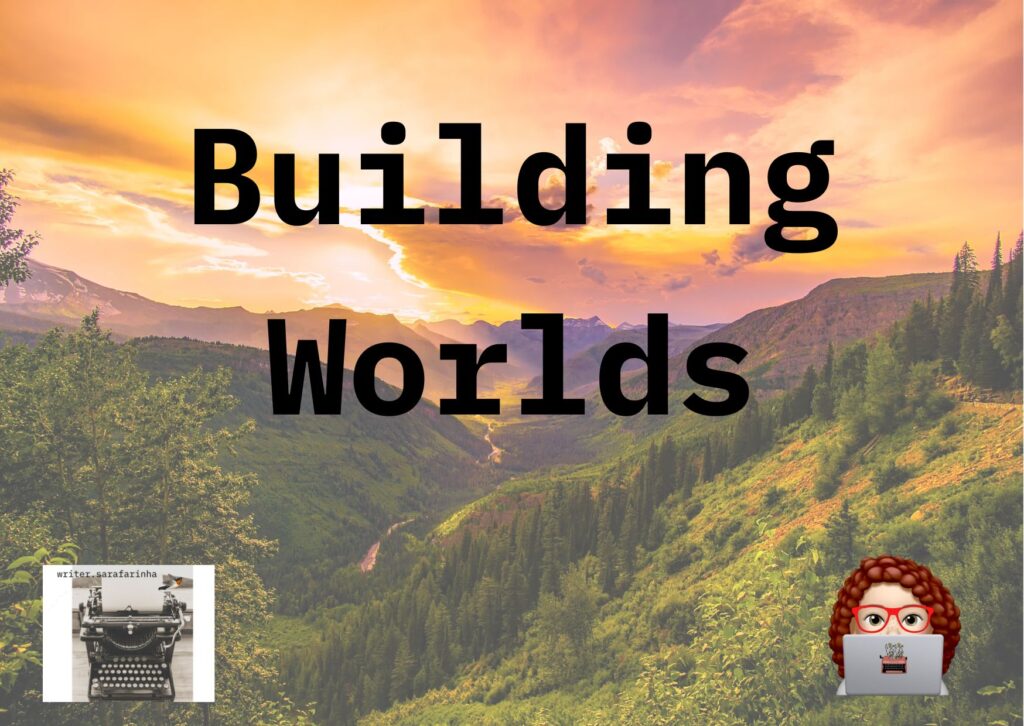
Hello all! Welcome back to this blog.
World Building is hard, fun, messy and an inspiring cluster of moments to be had, while writing a story.
To create a full, well developed, verisimilar picture of a new society, in whichever form and size, means we have to be ready to explore.
And we explore by imagining some complex interactions, rules and possibilities of functions and purposes. We explore by asking ourselves ‘What if?‘
World Building is also very fun, and we can have a great time imagining and developing some physical, personal and social landscapes in order to make a certain story work.
Building a new world usually means that we want it to be special and unique.
But sometimes, we have all of these ideas, already seen in other books, series and movies, that makes us doubt if we are indeed writing something new or even good enough. Making us doubt of what we intended to create, and getting us not to put enough time in working out the particulars of that special world.
How to come up with remarkable ideas for our World Building?
Learning about other people’s creative processes might give us a glimpse on how their new ideas came to be. It might help us discovering our own process to invent our own strategies to uncover our imaginative process.
I suggest that you watch the documentary ‘Abstract, the Art of Design’ for a great glimpse of other people’s creative processes.
But, more frequently than not, we see their processes as a confluence of different factors, including their own unique reality and life experiences. And, let’s face it, we can’t replicate that. All we can do is live our own life experiences and use them the best we can.
So, looking to other people’s creative processes teach us an invaluable lesson: Use your beliefs, inner thoughts and fears to create our Story Worlds.
There’s a constant need to look around and analyse how we see the world, how we react in certain situations, what we believe in and how those beliefs have changed over time.
There is great potential here. Not just for the things we would like to advocate in behalf of, while writing our stories, but also looking frankly at our hidden agendas, those thoughts we find uneasy and some of them even shameful.
And then, there is fear.
Fear can be our ultimate telltale sign that we need to work on that through a story. Not as a way to deal with it, even if it could be that, but as a spark of inspiration from which to build upon.
When we are writing Fantasy, being in a dystopian novel for example, we may construct a more believable story if we tap into our own experiences and thoughts.
I guess we all have came into contact some pretty messed up world views, peer pressure, or non-sensical beliefs. We might as well put them under a new light and scrutinise if any of those would fit our story just right.
Building a brand new world is, and cannot be in other way, connected to how we experience the reality we live in.
We may set the action in a far away galaxy, in a totally different body, or even in a totally different existential and corporeal plane, but we all start from the same reality in which we live in.
My father used to say that “all the things that exist are from this world. We cannot invent anything that we hadn’t already seen or experienced in this world.”
I agree with that. We can only reimagine what we have seen or experienced in some way. And all of it came from this world we live in.
We cannot think outside-the-box, if we have no ideia of what exists beyond it’s confinements. For example in sci-fi stories, assuming there could be something existing outside what we know, and having clear notions that there are rules to the functioning of this world in which we live in, we can only extrapolate into how things could be in other worlds.
Initially, we draw inspiration from the knowable in order to build a new world, somehow inventive, by reapplying the old and conveying things in a new format. And then we go deeper into the rabbit whole, if we can. We conjugate different ideas, crisscrossing from distant experiences and knowledges.
It’s not just having some knowledge but learning to recognise it’s potential and integrate it.
We use what we’ve got, specially if it’s a cross between a chihuahua and a fountain pen, or an ugly feeling and an online game, or chicken legs and a house foundations. Any one of these fortuitous connections may give us that idea that will make our story special.
World Building doesn’t mean just physical location. It envolves people, traditions, cultures, belief systems, interactions, associations, objects, daily tasks… all of the things that we experience in our own existences adapted into this new world that we are creating.
Because a martian would never walk like an earthling, would he? Or an addict would never rationalise some random thought in the same way that someone without that particular addiction would.
There are different knowledges to be pursued and other connections to be made between the simplest thing in that particular world. And our job as storytellers is to make those connections if we can.
So on we go into other worlds in order to discover our own.
Please leave a comment and subscribe for more content.
Bye and Keep writing! ✍🏼
***
References:
- Documentary ‘Abstract, the Art of Design’
- Book ‘The Art of War for Writers’ James Scott Bell
- Online Article ‘Worldbuilding tips for starting your new world‘ by Janet Forbes
- Online Article ‘That One Time an Art Historian and Johannes Vermeer Blew’ by R. Cross
One thought on “Considerations about Building Worlds”